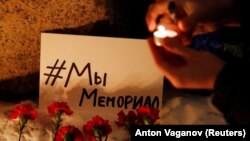MOSCOW -- Memorial, one of Russia's most respected human rights groups, says a court has rejected its appeal of a ruling that would have forced the organization to close for allegedly violating the controversial "foreign agent" law.
"The first court of appeals has upheld the decision to shut down the Memorial human rights center. The second court of appeals will look into the appeal in six months. We will see you again. We will be back. Russia will be free," Memorial tweeted on April 5.
In December, the Moscow City Court ordered the closure of the Moscow-based group for violating the "foreign agent" law.
That same month, the Supreme Court ruled that Memorial International, a standalone group and the umbrella organization for many regional branches and the Memorial Human Rights Center, should be liquidated on the same charge.
Last month, the Supreme Court of Russia turned down Memorial International's appeal on the ruling to liquidate the organization, as well.
The "foreign agent" law has been increasingly used by officials to shutter civil society and media groups in Russia.
Rights activists have said there are no legal grounds to liquidate either of the organizations, which have been devoted since the late 1980s to researching and recording the crimes of the Soviet Union and promoting human rights in Russia and former Soviet republics.
They say the demand by the Prosecutor-General's Office to shut down Memorial is a politically motivated decision.
The original 2012 legislation, which targeted NGOs and rights groups, has since been expanded to target media organizations, journalists, YouTube vloggers, and nearly anyone who receives money from outside of Russia and, in the eyes of the Kremlin, voices a political opinion.









